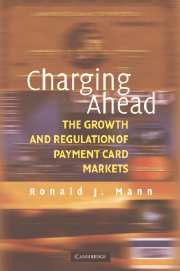Book contents
- Frontmatter
- Contents
- Figures and Tables
- Acknowledgments
- Introduction
- PART I THE BASICS OF PAYMENT CARDS
- PART II EASY MONEY
- PART III THE PUZZLE OF PAYMENT CARDS
- PART IV REFORMING PAYMENT SYSTEMS
- 11 Indirect Approaches: Regulating Interchange and Encouraging Surcharges
- 12 Contract Design
- 13 Regulating Information
- 14 Product Design: Affinity and Rewards Programs and Teaser Rates
- PART V OPTIMIZING CONSUMER CREDIT MARKETS AND BANKRUPTCY POLICY
- Conclusion
- Appendix: Country-Level Data
- Notes
- Bibliography
- Index
12 - Contract Design
Published online by Cambridge University Press: 06 July 2010
- Frontmatter
- Contents
- Figures and Tables
- Acknowledgments
- Introduction
- PART I THE BASICS OF PAYMENT CARDS
- PART II EASY MONEY
- PART III THE PUZZLE OF PAYMENT CARDS
- PART IV REFORMING PAYMENT SYSTEMS
- 11 Indirect Approaches: Regulating Interchange and Encouraging Surcharges
- 12 Contract Design
- 13 Regulating Information
- 14 Product Design: Affinity and Rewards Programs and Teaser Rates
- PART V OPTIMIZING CONSUMER CREDIT MARKETS AND BANKRUPTCY POLICY
- Conclusion
- Appendix: Country-Level Data
- Notes
- Bibliography
- Index
Summary
Over the last several years, I have presented this research to various groups: American law faculties, undergraduate students, bar associations, and economists at central banks in different countries. I make the argument that the problem with credit cards lies in the cardholder-issuer interface, and then propose ways to redress the imbalance between the product-design capabilities of the card issuers and the typical cardholder's limited capacity to resist skillful marketing. The most common response is that it is simple for any well-educated person to avoid becoming a revenue-generating cardholder. All that is required, one would think, is careful attention to the terms of the contract between the cardholder and the issuer.
Thus, someone usually claims to have found a simple way to avoid the risks of card usage. Some will say, for example, that the trick is to find a card with no annual fee and be sure to pay your bill on time every month. More recently, with increased attention to shortened grace periods, I have heard colleagues explain with pride their careful efforts to pay their bills multiple times a month to avoid interest payments (sometimes doing so even before the purchases are made). Still others claim to have successfully mastered the practice of shopping teaser rates or making the most of rewards programs without paying interest or fees. I have not yet engaged any of those respondents in a conversation without concluding (usually silently) that the person in fact is probably a profitable customer for their card issuer.
- Type
- Chapter
- Information
- Charging AheadThe Growth and Regulation of Payment Card Markets around the World, pp. 128 - 153Publisher: Cambridge University PressPrint publication year: 2006

